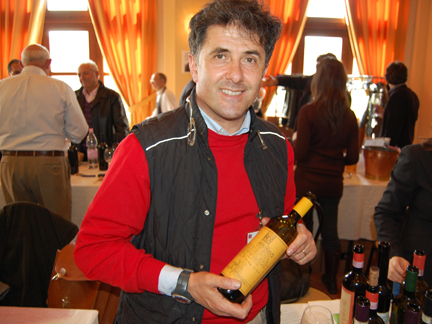Today’s episode of the Italian Grape Name and Appellation Pronunciation Project is devoted to Sagrantino, a grape grown in Umbria where it is used to make the eponymous Sagrantino di Montefalco. I asked one of the appellation’s leading producers, Giampiero Bea, to contribute a video to the series and he did so with his signature showmanship.

It seemed appropriate to feature Sagrantino this week in the wake of my post on Giampiero’s 1998 Sagrantino, 98 Paolo Bea Sagrantino: Holy Shit!, which received a lot of comments here and over on the Facebook. The playful title was partly a play on the name of this grape, Sagrantino, most likely from the Latin sacrum, something holy or sacred (the ampelonym is probably owed to the fact that Sagrantino was used in Umbria as sacramental wine).
Yesterday, I called Giampiero who told me that he believes the 1998 to be one of his greatest vintages. “It was part of a string of excellent vintages,” the remarkable and now legendary harvests that ran consecutively from 1995 to 2001 in Italy. “Many thought 97 was going to be the greatest vintage of these,” said Giampiero, “but ultimately 98 turned out to be the better vintage: it wasn’t too hot or too cold, there was ample rainfall but it wasn’t too humid nor too dry.” In other words, it was the classically balanced vintage that renders unto Italy wines that resonate with the people who make them, id est, Italians. (As many of you know all too well, a handful of American wine writers championed the warmer 97 vintage as one of the best of the century, a harvest that has been come to be called, with no lack of irony, the great “American vintage” in Italy.)
The inimitable Ken V noted in the comment thread that “The 98 is an unusual vintage for this wine. It has drunk well since release.”
When I asked Giampiero about this observation, he told me, “you’ll see a lot of variation from vintage to vintage in our wines because we let Nature — not our work in the cellar — determine what the wine will be. If we get it wrong, it’s because we didn’t do a good job of interpreting Nature.”
I’m here to tell you that the 1998 Sagrantino by Paolo Bea is one of those grand occasions when humankind and Nature sang and continue to sing in perfect harmony.

I love the word sagrantino: it sounds so Umbrian. But then again, I am biased ;)
one day we’ll taste some Bea together Simona! :-) I love the word Sagrantino, too! It very much fits in with the land of St. Francis, no?